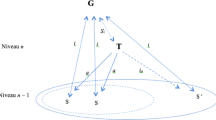Abstract
In our contribution to this special issue on thought experiments and mathematics, we aim to insert theology into the conversation. There is a very long tradition of substantial inquiries into the relationship between theology and mathematics. Platonism has been provoking a consolidation of that tradition to some extent in recent decades. Accordingly, in this paper we look at James R. Brown’s Platonic account of thought experiments. Ultimately, we offer an analysis of some of the merits and perils inherent in framing the use of thought experiments in mathematics and theology in terms of Platonism.
Similar content being viewed by others
References
Atkins P (2018) Conjuring the universe: the origins of the laws of nature. Oxford University Press, Oxford
Benzmüller C (2019) What is a proof? What should it be? https://arxiv.org/abs/1904.06332.
Berger P (2014) The many altars of modernity: toward a paradigm for religion in a pluralist age. De Gruyter, Berlin
Brooke JH (1991) Science and religion: some historical perspectives. Cambridge University Press, Cambridge
Brown JR (1986) Thought experiments since the scientific revolution. Int Stud Philos Sci 1:1–15
Brown JR (2008) Philosophy of mathematics: a contemporary introduction to the world of proofs and pictures, 2nd edn. Routledge, New York
Brown JR (2011a) The laboratory of the mind: thought experiments in the natural sciences, 2nd edn. Routledge, New York
Brown JR (2011b) Swinburne on God and simplicity. Jahrbuch Für Religionsphilosophie 10:195–204
Davies P (1992) The mind of God. Penguin, New York
Fehige Y (ed) (2016) Science and religion: East and West. Routledge, New York
Fehige Y (2018) Thought experiments and theology. In: Stuart MT et al (eds) The Routledge companion to thought experiments. Routledge, New York, pp 183–194
Fehige Y (2021) The Annus mirabilis of 1986: thought experiments and scientific pluralism. HOPOS J Int Soc Hist Philos Sci 11:222–240
Gaunilo (1926) On behalf of the fool. In: Anselm of Canterbury. Proslogium; monologium: an appendix in behalf of the fool by Gaunilo; and Cur Deus Homo, 2nd edn (trans: Deane SN). The Open Court, Chicago
Gingras Y (2017) Science and religion: an impossible dialogue (trans: Keating P). Polity Press
Habermas J (2019) Auch eine Geschichte der Philosophie, 2 Bände. Suhrkamp, Frankfurt am Main
Harrison VS (2017) Mathematical objects and the object of theology. Relig Stud 53:479–496
Lakatos I (1978) What does a mathematical proof prove? In: Worrall J, Currie G (eds) Philosophical papers, vol. 2: mathematics, science and epistemology. Cambridge University Press, Cambridge, pp 61–69
Leibniz GW (1875–1890) Die philosophischen Schriften, Gerhardt CJ (ed). Weidmannsche Buchhandlung, Berlin (references indicate volume and pages)
Leibniz GW (1923) Sämtliche Schriften und Briefe. Deutsche Akademie der Wissenschaften zu Berlin (references indicate volume, issue, number of the work, and pages)
Meixner U (2000) On some realisms most realists don’t like. Metaphysica 1:73–94
Nicholas of Cusa (1932) Opera omnia vol. 19: De docta ignorantia. In: Hoffmann E, Klibansky R (eds). Meiner, Lipsia
Oppenheimer PE, Zalta EN (1991) On the logic of the ontological argument. In: Tomberlin J (ed) Philosophical perspectives 5: the philosophy of religion. Ridgeview, Atascadero, pp 509–529
Oppenheimer PE, Zalta EN (2011) A computationally-discovered simplification of the ontological argument. Australas J Philos 89(2):333–349
Oppy G (1995) Ontological arguments and belief in God. Cambridge University Press, Cambridge
Schellenberg J (2009) Philosophy of religion: a state of the subject report. Tor J Theol 25:95–110
Swinburne R (2010) God as the simplest explanation of the universe. Eur J Philos Relig 1:1–24
van Fraassen B (1980) The scientific image. Oxford University Press, Oxford
Author information
Authors and Affiliations
Corresponding author
Additional information
Publisher's Note
Springer Nature remains neutral with regard to jurisdictional claims in published maps and institutional affiliations.
Rights and permissions
About this article
Cite this article
Fehige, Y., Vestrucci, A. On Thought Experiments, Theology, and Mathematical Platonism. Axiomathes 32 (Suppl 1), 43–54 (2022). https://doi.org/10.1007/s10516-022-09627-1
Received:
Accepted:
Published:
Issue Date:
DOI: https://doi.org/10.1007/s10516-022-09627-1




